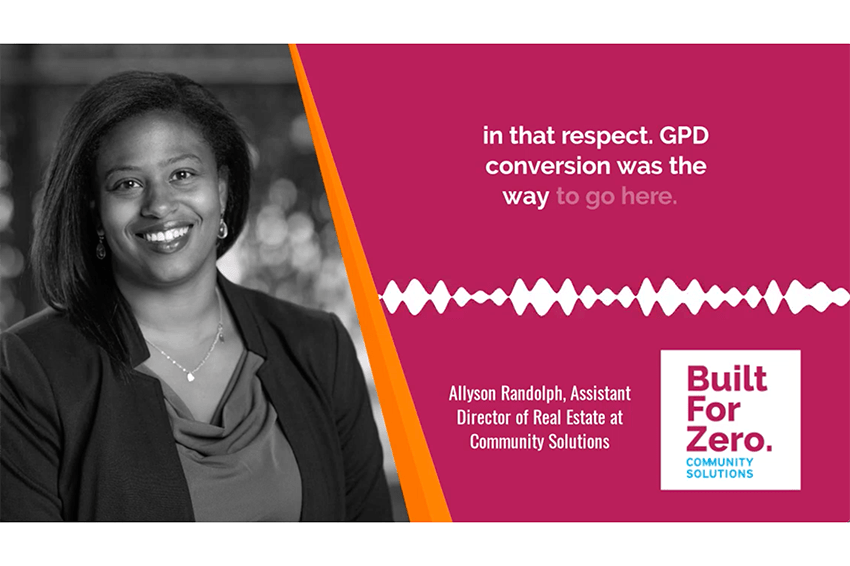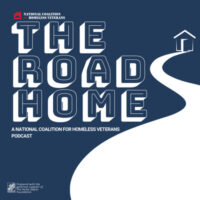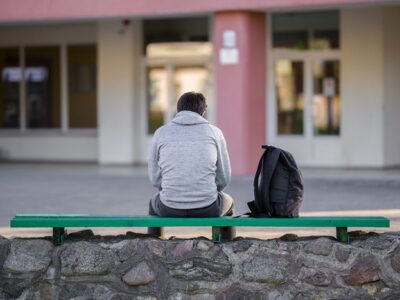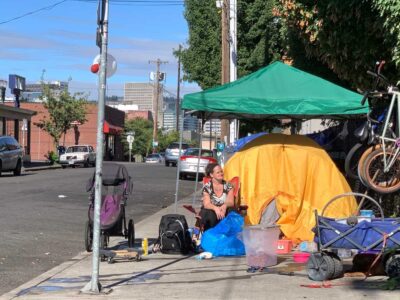Our nation has made tremendous progress toward reducing and ending veteran homelessness. This progress offers not only an opportunity to recognize what got us this far, but to reassess what changes are needed to go even farther.
Recently, a coalition of partners — Community Solutions, U.S.VETS, Volunteers of America, and National Coalition for Homeless Veterans, supported by The Home Depot Foundation — identified that greater flexibility around the U.S. Department of Veterans Affairs’ Grant and Per Diem program could help even more veterans exit homelessness and achieve housing stability as quickly as possible.
The Grant and Per Diem (GPD) program currently funds transitional housing facilities on a per diem basis, (in other words, temporary beds for veterans experiencing homelessness).
Dr. Chad Audi was operating one of these programs through the Detroit Rescue Mission Ministries (DRMM). He understood that his community was making progress in driving reductions in veteran homelessness. Since 2018, Detroit has decreased veteran homelessness by 42%.
But as these numbers went down, he recognized that what the veteran population may need going forward was different then what they had needed to date. And what was needed now was more permanent housing.
“We thought, what does it take for us to go and start finding a permanent solution to the homeless and not a transitional solution?” Audi said.
With support from Community Solutions and our partners at The Home Depot Foundation and Rocket Community Fund, DRMM decided to convert its 61 GPD beds into permanent housing for veterans. This conversion project has the potential to cut veteran homelessness in Detroit by as much as 50%, once completed in 2022.
In a conversation with National Coalition for Homeless Veterans’ “The Road Home” podcast, Dr. Audi joined Community Solutions’ staff Allyson Randolph and Leslie Wise to discuss the decision to go forward with a conversion, the process, and progress to date.
Read on for highlights from the conversation.
Why convert the GPD property?
Dr. Chad Audi, President and CEO of nonprofit Detroit Rescue Mission Ministries (DRMM), the nonprofit that operates 211 Glendale:
“One of the major problem that we always faced is: how can you find a permanent solution to the homeless veterans? And not just to come back to homelessness or stay temporarily not homeless.
We have been a long-term providers of GPD programs and transitional housing programs for homeless veterans. And we thought, what does it take for us to go and start finding a permanent solution to the homeless and not a transitional solution?”

How is data used to help inform this housing solution?
Leslie Wise, Lead, Direct Community Support at Community Solutions:
“In Built for Zero communities, we have month to month data we refer to as our by-name list. So we have that data to look at. We also look at, in partnership with the local VAs and the local continuums, utilization rates for GPD.
And we hope that as the active homeless number of veterans goes down the need for transitional housing may also go down, so that we can transition and support the awesome and very, very experienced providers that have historically been providing GPD services to continue providing services to veterans ongoing and leveraging those supports just in a permanent housing model.
We did that in Detroit. In partnership with those providers, we looked at that data. We looked at utilization rates, and we made sure that increasing permanent affordable housing with DRMM was in line with the goal of the local Detroit community to reduce and end veterans homelessness. And it was.”
What does it take to convert a GPD property into permanent housing?
Dr. Audi:
“The building was a single room occupancy setup and it will be totally transformed to individual apartments. So every veteran will be able to live in total independent living, without having to share anything with anybody else.
The construction is going to be totally renovated and it will be 100% apartment living, not any more people living together or sharing space together.”
Allyson Randolph, Assistant Director, Real Estate at Community Solutions:
“We’re planning to spend $750,000 to do exactly what Dr. Audi mentioned, and that’s convert these hotel style suites into studio apartments for each of the veterans that includes adding kitchenettes, cabinets, stoves, microwaves to each unit. Updating the flooring, the window fixtures, the ceiling tiles, and then also upgrading the bathrooms as well to make it a really fairly comfortable place for all the veterans to live moving forward.
From a timeline basis, right now we’re in the middle of the rehab. We’re hoping to finish the units by the beginning of next year and then have a fully occupied building by the end of the first quarter next year.”
Who will live in these new units?
Randolph:
“We’re finding veterans through our partnership with the VA. So each veteran will have access to HUD-VASH vouchers and other rental assistance and that will provide the rent that’s needed to operate the building moving forward.”

“When it came to Detroit, we looked at the data and determined that a conversion of this project could reduce veteran homelessness by as much as 50%.”
— Allyson Randolph, Assistant Director, Real Estate at Community Solutions
Can this kind of GPD conversion work in other communities?
Randolph:
“We came up with a four pillar plan as a rubric that we could implement in other communities to decide if a GPD conversion is the right resource and the right solution.
The first part of that plan is community buy-in. We look at the data that’s collected from our on the ground teams to determine if GPD is actually the barrier to ending homelessness in that community. When it came to Detroit, specifically, we looked at the data and we determined that a conversion of this project in particular could reduce veteran homelessness by as much as 50%. So in that respect, GPD conversion was the way to go here.
Number two is buy-in from the GPD provider and that came from the conversations that Community Solutions had with Dr. Chad Audi and his team to make sure that we were aligned in the mission and values so that we could actually do this transition effectively. And that we were all on board with how it would work.
Number three: is a sufficient capital funding? Do we have enough money in order to do the rehab work? In this case, Rocket Community Fund and The Home Depot Foundation provided us with that amount of money so that the conversion could actually take place.
Number four is the viability of the operations going forward. We had to ask ourselves a number of questions. The first one being, will the revenue that the building will receive from voucher holders and from other rental assistance, will that support the operating expenses on a go-forward basis? Namely can the property support insurance costs, administrative costs, requests for repairs, and maintenance on a go-forward basis.
Also does the property itself lend itself to be a place that veterans would want to live in the future? Is it close to transit? Is it close to the VA? Is it close to job centers? These are questions that we have to ask ourselves to determine if the project is viable.”
Dr. Audi
“All in all, it is a great partnership with Community Solutions. We think that this program will be very successful. It will protect the dignity and respect of the homeless veterans. They will be able to get much better services than we were offering them in GPD.
No one loses on anything: not on the service part, not on the financial part. So that’s why we’re very, very, very happy with this project.”





